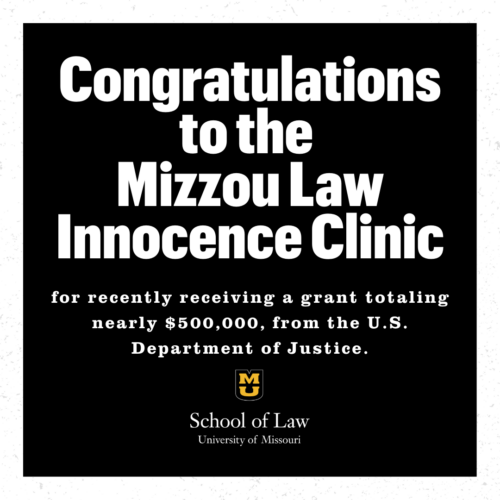
The grant totaling nearly $500,000, from the U.S. Department of Justice will help MU law students and the Midwest Innocence Project review a backlog of cases of possible innocence involving Missourians
Contact: Sara Diedrich
573-882-3243
diedrichs@missouri.edu
COLUMBIA, Mo. – For more than 10 years, students at the University of Missouri School of Law have been working with the Midwest Innocence Project (MIP), a non-profit organization located in Kansas City, Missouri, to investigate cases of possible innocence in five Midwestern states.
Still, there is a backlog of cases that need attention, most pressingly in the Show-Me State.
A new grant, totaling nearly $500,000, from the U.S. Department of Justice, will begin to chip away at that backlog by providing resources to review cases involving Missourians convicted with the use of eyewitness testimony and for whom DNA testing might now prove their innocence. The two-year grant will cover the cost of staff and case expenses needed to help MU law students and MIP review 190 eyewitness cases identified in Missouri, beginning with 55 cases originating in St. Louis.
“What makes this grant so helpful is that there are a significant number of cases of possible eyewitness misidentifications that need investigation, especially in Missouri,” said Rod Uphoff, professor emeritus at the MU School of Law. “This grant is a great benefit for not only our law students but also for those Missourians currently in prison who are struggling to show that they are innocent.”
The grant will cover the cost of a full-time supervising attorney to direct students in the MU law school’s Innocence Clinic. Additionally, funds will go toward hours spent by an MIP investigator to locate evidence and an MIP paralegal to collect case files, submit open records requests and obtain prior filings from clerks of court. Finally, funds will be used to test evidence for DNA. All along, MU law students will be reviewing and investigating MIP cases in Missouri identified for this project.
“The Innocence Clinic is a great opportunity for our students to learn how to gather facts because they really have to go out and dig for information,” said Lyrissa Lidsky, dean of the MU School of Law. “They need to learn how to investigate cases; this gives them that opportunity.”
Even though the grant runs from Jan. 1, 2020 to Dec. 31, 2021, Uphoff said the MU law school is committed to continuing the Innocence Clinic and is actively seeking other funding sources.
“It’s a wonderful learning experience for our students,” he said. “They become better prosecutors and defense attorneys because of what they learn about these cases.”
According to a review by the Nation Registry of Exonerations, eyewitness misidentification has been a key contributor to wrongful convictions. For example, of the 364 exonerations resulting from DNA testing nationally, 255 — or 70% — involved eyewitness misidentification. Of the nine DNA-based exonerations to date in Missouri, eight involved eyewitness misidentification. And MU law students have played significant roles in the representation of other MIP clients, including Rodney Lincoln, who was released in 2018. MIP and MU law students also work on cases originating in Kansas, Nebraska, Iowa and Arkansas.
“Through this experience, our students learn that the system isn’t fool-proof,” Uphoff said. “They learn about potential flaws in the system and how we can go about addressing those flaws.”
-30-